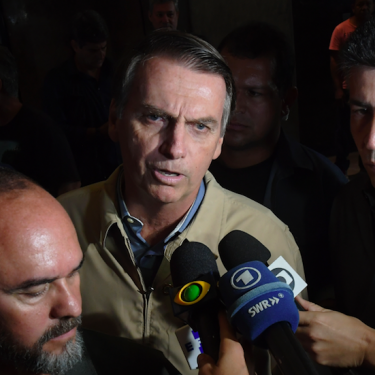Bolsonaro poses a serious threat to press freedom and democracy in Brazil

Reporters Without Borders (RSF) is very concerned for Brazil’s future as Jair Bolsonaro, the clear favourite to win the presidential election run-off on 28 October, continues to wage a campaign marked by hate speech, disinformation, violence against journalists and contempt for human rights, fuelling tension and fear of dark times ahead for democracy and press freedom.
After one of the most confused and polarized campaigns in Brazil’s recent history, Bolsonaro, the far-right leader of the Social Liberal Party (PSL), got 46% of the votes in the first round, far more than runner-up Fernando Haddad of the left-wing Workers’ Party (PT), who got 29%.
A 63-year-old former army officer, Bolsonaro announced just minutes after the first-round results that he intended to “put a final stop to all forms of activism in Brazil,” succinctly summarizing his authoritarian and reactionary ideology.
A member of eight different parties since entering politics in 1988 and a member of the federal chamber of deputies since 1991, Bolsonaro has long been notorious for his populist and aggressive comments, his calls for a return to order and discipline, and his open attacks on women, gays and Brazil’s indigenous population. Declaring himself to be the “anti-system candidate,” he has built his support through social networks, where his statements and his views have circulated widely, sidestepping the traditional media.
In a country where two-thirds of the population get their news on social networks, WhatsApp has played a key role in the campaign. It is usurping the traditional news outlets and, according to a DataFolha survey released on 3 October, is the preferred source of information for 61% of Bolsonaro’s voters, of the mainstream media.
More than any other platform, it is WhatsApp that has been used to organize and circulate false information – designed above all to discredit journalists whose reporting is critical of the PSL – together with smear campaigns and conspiracy theories.
Media targeted
In this tense climate, journalists have been the favourite targets of Bolsonaro supporters and hate groups, especially on social networks. Many fact-checking journalists have been harassed during the campaign, as RSF reported on 28 September.
One of Brazil’s most respected journalists, Miriam Leitão (GloboNews;O Globo;TV Globo), has been subjected to a massive smear campaign, receiving hundreds of insults and threats on social networks as a result of an article published on 5 October about the dangers that Bolsonaro’s candidacy poses to Brazilian democracy.
False claims that Leitão was arrested for a hold-up in the 1960s were widely circulated online. In fact, she was detained and tortured for political reasons in 1972, during the military dictatorship.
Two other women journalists, who cannot be named for safety reasons, suffered the same fate. One, a reporter for the NE10 news website, was attacked and threatened with rape by Bolsonaro supporters on the day of the first-round voting. “When the commander is president, all the press will be killed,” they told her when they saw her press card.
According to the Brazilian Association of Investigative Journalism (ABRAJI), there have been at least 137 election-related physical and online attacks against journalists in 2018 by activists of all political tendencies.
Asked about the violence seen all over the country, Bolsonaro initially just talked of isolated cases. “I have no control over the millions and millions of people who support me,” he said on 9 October. “Let’s not get things back to front. I was the one who as stabbed (...) the violence and intolerance is coming from the other camp.”
Bolsonaro was indeed stabbed in the stomach and was badly injured during a visit to Minas Gerais state on 6 September. At the time, he cut back his public statements and appearances and posed as the victim of the climate of hate, although he had been the climate’s main instigator.
“The hate speech and disinformation campaigns by the candidate's supporters against their political opponents are undermining Brazil’s already highly polarized society,” RSF secretary-general Christophe Deloire said. “Brazilian voters must not be taken in by a sham discourse that conceals real violence, a violence that will not spare journalism. Jair Bolsonaro poses a serious threat to press freedom and democracy.”
Authoritarianism and contempt for human rights
A nationalist and staunch defender of the 1964-1985 military dictatorship, Bolsonaro has openly advocated the use of torture since 1999. He said in a TV interview that the military “should have killed 30,000 people starting with Fernando Henrique Cardoso,” a former president who was exiled during the dictatorship. He said on a radio station in 2016 that “the dictatorship’s mistake was to torture without killing.”
On 7 July, Bolsonaro was asked about an Inter-American Court of Human Rights decision to condemn Brazil for failing to prosecute those responsible for the journalist Vladimir Herzog’s murder during the military dictatorship. He responded by suggesting that Herzog killed himself, which is what the military claimed at the time.
During the campaign, Bolsonaro has openly opposed the work of human rights defenders, accusing them of defending criminals instead of victims and of working against Brazil. He has threatened to stop public funding for the human rights sector and has said that, when president, he will pull Brazil out of the UN Human Rights Council, calling it “a meeting of communists with no commitment to Latin America.”
Brazil is ranked 102nd out of 180 countries in RSF’s 2018 World Press Freedom Index.



